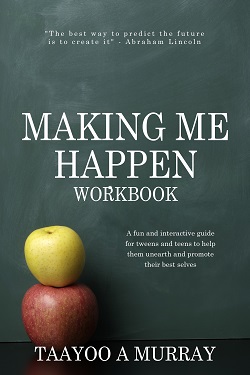By Taayoo A. Murray
In the Caribbean, there is an expression, "Seven brothers, seven different minds". As parents, we often try to fit our children into molds. The belief is that if we know where they fit, we can better parent them.
As a mom of boys with two distinctly different personalities and interests, I have had to deal with this phenomenon personally. My 13-year-old is an athlete. Typically, kids like him tend to be outgoing, extremely likable, physically fit, and have an overdose of self-confidence. They tend to be smart, but not always overly interested in academics. After all, they spend extremely long hours at training and games.
Then there is my 8-year-old. He's the scholar. Typically, scholars are high academic performers with very curious minds. They tend to be consumed with books and any medium that will satisfy their thirst to understand and know more.

I learned the hard way that these molds are nothing but stereotypes. While I see aspects from both descriptions above in my sons, they are more than these stereotypes, they are INDIVIDUALS. Or, as I call them, my little men. In coming to grips with trying to adequately parent two uniquely different and sometimes opposite personalities, I have developed five parenting tips:
1. Acknowledge and celebrate their differences
The first thing I had to learn was to acknowledge and accept each of my sons for who they are. This is not as simple as it may seem, because every parent secretly has their own idea of who and what they want their child to be. As a scholar myself, with zero interest in sports, it was extremely difficult for me to understand much less accept how I could give birth to a child who delights in and finds complete joy in a soccer ball. I was relieved when my second son came along, to finally have a child that reads, and was guilty of expressing that. Inadvertently, I wrongly communicated that the interest of one son was better than the other.
We must acknowledge each child's area of interest. This means a vocal endorsement so that your child knows that you see where their interest lies. You may think you have accepted the interest, but your child will not know until you tell him or her.
Going to your child athlete's game may not be enough. Making sure to schedule their training sessions into the family calendar demonstrates that their sport is important.
For the scholar, facilitating time for discussions gives them an opportunity to open the reservoir of knowledge that they have accumulated. It also conveys to them that you think they are important, because you take the time to listen. That can boost the self-esteem quotient that sometimes can be lacking for introverted scholars.
Secondly, acknowledgement is not enough, you must celebrate them. Make a splash! A goal scored, an MVP designation are grounds for excitement. Remember to equally hype the completion of a new book or the A on the exam. Both are exceptional accomplishments that should not go unnoticed.
2. NEVER compare them
It is an absolute no-no to compare the scholar to the athlete. They are two different individuals with two different make ups. In our frustration as parents, it is very easy to vent and say we wish one was like the other. The athlete may not be academically inclined, overly analytical about issues and have a superb vocabulary. What they do have going for them is extreme self-confidence and self-motivation. The child athlete is disciplined and organized, with understanding of responsibility. That child athlete also has a winning mindset and knows how to persevere through failure.
Inadvertently, the scholar may not be as responsible and appear to have it all together. Absentmindedness that results in constant misplacement of belongings may drive you insane. However that mind! That curious and analytical mind will delve into problems like there's no tomorrow. Never mind the in-depth conversations that will have you reaching for your lexicon and doing private research to keep up. They are different, but it's their differences that make them unique.
3. Plan activities/outings geared towards their differences
One of the greatest challenges of raising children with different interests and personalities, is planning family trips/outings. How does one cater to the athlete's need for constant activity and action, versus the scholar who wants to learn, absorb, and explore? Like all parenting tasks, it takes careful and deliberate planning. You look for places that allows for use of the child's motor skills, while stimulating imagination and thought. These would include Math Museums, trips to historical sites that inspire awe like the Grand Canyon and Mount Rushmore. Movies that have the right balance of action and a well-developed story line that can be analyzed and appreciated, will appeal to both the athlete and the scholar. I also recommend when possible to plan individual activities. This will further cement your child's belief that you appreciate their interest and give you a chance to learn more about the area while analyzing how engaged the child is with their interest.
4. Use their differences as a teaching tool
One of the biggest reasons for conflict in our society today is the lack of tolerance for others' beliefs, ideas, and habits. There seems to be a tsunami of everyone wanting to force their ideas on the other person, with no regard for their neighbor's perspective. Parenting a scholar and an athlete is an excellent environment in which to teach tolerance, as you have two individuals with often conflicting interests and viewpoints, cohabiting in close environs. Excelling in their respective areas makes them approach conversations and activities from opposite ends of the spectrum, thus making it imperative that they learn to understand and respect the others' opinion. Rather than yelling shut up and placing them in separate rooms to cool off, insist that each person present their opinion and the other listen.
As the parent, play the role of mediator, assisting in the communication process, ensuring that what is said is communicated and interpreted as intended. They may not always agree, but they will learn to disagree respectfully. This will teach them tolerance for others outside the home and develop vital conflict resolution skills. By perfecting the art of articulating their opinions and listening to others, it lessens the likelihood of your child being drawn into unnecessary confrontations.
5. Convert their interests into marketable skills
We exist in a world where everything can be sold, it's just how it is marketed. Gone are the days of traditional means of employment and new ground is broken every day on areas for business. That being said, NEVER discourage your child's interest unless it endangers their health or well-being, you may never know where it may take them. While you may not think your child athlete will go pro, the skill sets of discipline, perseverance and a winning mindset are vital for success in any area of life. Your scholar does not have to be a medical doctor, but that enquiring mind can be the home of an invention that will change human existence as we know it.
Our responsibility as parents is to create the environment that allows for our children to fully develop their interest into a marketable skill. This of course requires effort on our parts. Research your children's interest and see if there is a lucrative profession in the area. If there is no direct profession, search for relatable areas that they can transition into. Remember that the personalities and character traits that they develop while pursuing their interests, are equally important in their quest for a profession. Having done that, it is our responsibility to find activities and training that will develop and hone these skills to perfection. Focus on the becoming, remembering that they are children and depend on us for guidance and support.
My mantra has always been that successful parenting is deliberate, personal and private. Having children with diverse interests may at times be challenging, but will never be boring! Developing the mindset of your home being a smorgasbord of choice, will encourage your already amazing children and further develop a purpose-driven child.

Born and raised in Jamaica, Taayoo A. Murray is an innovative youth coach, mentor and public speaker in Brooklyn, New York. She has successfully worked with at-risk youth to create and implement programs that redefined and changed the trajectory of their lives. Murray served as educational director at Children of the Future and a corporate trainer at Mana Group in New York. "Making Me Happen" is her first book.









